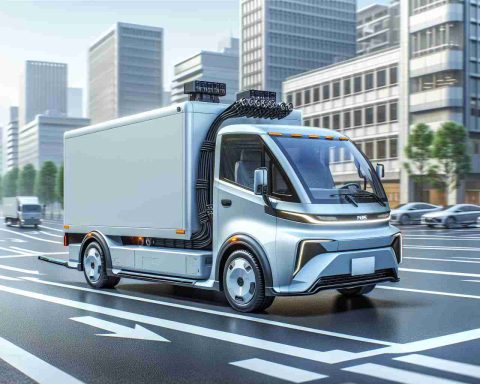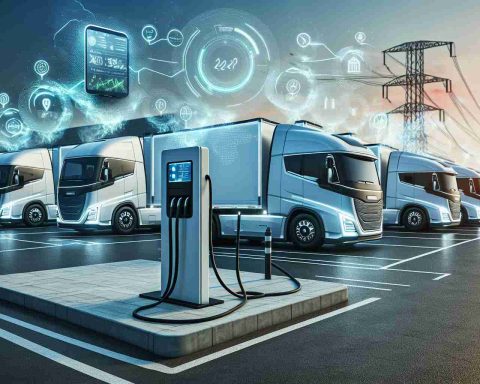Insight into the Electric Truck Market from 2025 to 2033
The electric truck market is on a meteoric rise, with its valuation projected to soar to USD 6.65 billion by 2033, up from USD 852.5 million in 2024. This remarkable growth marks a compound annual growth rate (CAGR) of 25.6% over the next several years.
Currently, North America holds the largest share in the electric truck market, driven largely by the increasing popularity of light-duty trucks, known for their versatility in urban deliveries. Hybrid electric trucks dominate the industry, effectively balancing range and emissions reduction.
The demand for electric trucks is significantly influenced by stricter emissions regulations across the globe, particularly in metropolitan areas. To meet sustainability goals, logistics companies are embracing electric models, aided by governmental financial incentives that enhance the affordability of these vehicles.
Furthermore, advancements in charging infrastructure play a crucial role in facilitating this transition. Investments in high-speed chargers and innovative technologies, like wireless charging, are paving the way for seamless integration of electric trucks into logistics operations.
Improvements in electric powertrain technology are also enhancing vehicle performance, making electric trucks an attractive alternative to traditional diesel options. The focus on efficiency and sustainability is set to reshape the future of transportation, as companies align with eco-friendly practices.
The electric truck market is poised for transformative growth, signaling a substantial shift in the automotive landscape.
Surging Toward a Greener Future: The Electric Truck Market Revolution
Insight into the Electric Truck Market from 2025 to 2033
The electric truck market is primed for explosive growth in the next decade, with its valuation expected to climb to an impressive USD 6.65 billion by 2033. This represents a staggering increase from USD 852.5 million in 2024, reflecting a robust compound annual growth rate (CAGR) of 25.6%. The drivers of this transformation are rooted in technology, regulations, and market demand, shaping a more sustainable future for transportation.
Key Trends and Insights
As the market evolves, several key trends are predicted to influence the electric truck landscape:
1. Regional Insights: North America is currently the leading market, primarily due to a surge in demand for light-duty trucks tailored for urban deliveries. With consumers favoring versatility, adoption rates are expected to rise sharply.
2. Hybrid Models on the Rise: The hybrid electric truck segment is gaining traction, combining the benefits of electric power with the reliability of traditional fuel sources. This hybrid model effectively balances range and emissions reduction, catering to industries with diverse operational needs.
3. Regulatory Impact: Stricter global emissions regulations are propelling the adoption of electric trucks. Urban centers, facing increasing air quality issues, are mandating lower emission vehicles. Consequently, logistics companies are investing in electric transport to comply with these new standards.
4. Government Incentives: Financial incentives provided by governments to promote electric vehicle adoption are enhancing affordability for businesses. These programs make transitioning to electric fleets financially viable, thereby boosting market growth.
5. Charging Infrastructure Development: The establishment of efficient charging networks is critical. Innovations in high-speed and wireless charging technologies, coupled with increased infrastructure investments, are crucial for supporting the widespread use of electric trucks.
Advantages and Limitations
Pros:
– Environmental Benefits: Reduced emissions contribute to improved air quality and compliance with stringent regulations.
– Long-term Cost Savings: Electric trucks can lower operational costs due to reduced maintenance needs and the lower price of electricity compared to diesel.
– Technological Advancements: Innovations in electric powertrains enhance performance, making electric trucks more competitive with conventional models.
Cons:
– Range Anxiety: Concerns regarding battery life and vehicle range can deter businesses from fully committing to electric solutions.
– Initial Investment: The high upfront costs of electric trucks versus traditional vehicles can be a barrier for some companies.
– Charging Infrastructure Gaps: Some regions still lack sufficient charging stations, which can hinder the adoption of electric trucks.
Future Innovations and Predictions
The future of the electric truck market appears promising, with several forecasts suggesting continued growth driven by ongoing technological advancements. Innovations in battery technology, such as solid-state batteries, could further enhance performance and reduce charging times. Additionally, improvements in logistics software that integrate route planning with charging station locations may optimize operations for electric fleets.
Use Cases
The versatility of electric trucks makes them suitable for various sectors, including:
– Urban Delivery Services: Ideal for last-mile logistics with lower emissions.
– Freight and Logistics: Suitable for regional hauls where infrastructure supports charging.
– Food and Beverage Distribution: Companies are increasingly opting for electric options to reduce their carbon footprint.
Market Analysis and Compatibility
The electric truck market is rapidly expanding, with manufacturers racing to innovate and capture market share. Companies such as Tesla and Rivian are leading the charge, while traditional truck manufacturers are also introducing electric models to meet market demands.
Conclusion
The electric truck market is on a transformative journey, driven by technological advancements, regulatory pressures, and a growing focus on sustainability. As companies transition to electric fleets, we can expect significant changes in the logistics and transportation sectors, ultimately leading toward a greener, more efficient future.
For the latest updates and insights on the electric vehicle industry, visit ASE.

















